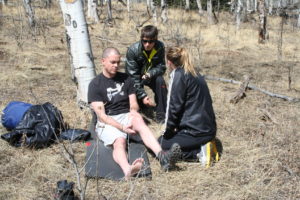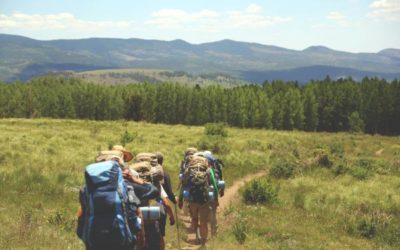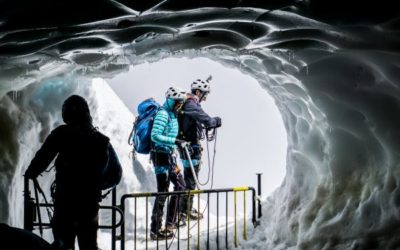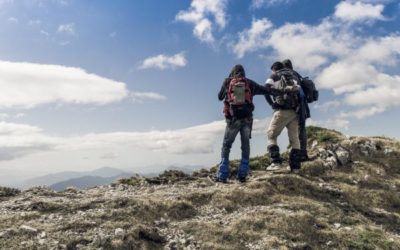Please enjoy this post from Andrew Underwood, from WMI as he continues to share insights in this Biblical Reflections on the Wilderness Essentials series.
Not long ago, in the Carpathian Mountains of Romania, one of the leaders that we were working with became ill. She was experiencing fatigue and a few other worrying symptoms. Being prepared to handle first aid situations in remote areas, our guide team was able to devise a plan to support and care for her.
One of the interesting things to watch for, in moments like these, is how the rest of the group responds to the needs of an injured or sick member of the team. As we watched and engaged, the rest of the group responded incredibly well. They divided up her gear, pack and all, and carried it on top of their own loads, even though the hardest day of climbing was ahead of us.
Watching this group, carrying the burden of their friend up the steep pass was beautiful. This gave her the reprieve that she needed to finish out the journey. As we closed out our trip, sharing our reflections with each other, this young lady that had been sick expressed how God had revealed himself to her and brought some unique aspects of healing to her life from experiencing the selflessness behavior of her friends.
Preparation is Key to Providing First Aid
Exposure in the wilderness is real. Though still painful, the consequences of spraining your ankle at the grocery store are negligible. In contrast, the consequences of the same injury, three days hike into a vast mountain wilderness, is serious, and could drastically impact your plan and the entire group’s well-being. So just like our experience in the mountains of Romania, you need to be prepared and ready to take care of everything from blisters to broken bones. This is why it makes sense that First Aid is one of the 10 Essentials of Wilderness Travel.

WFA Training with Wilderness Ministry Institute
Here are a few helpful considerations when planning your management of First Aid in the backcountry:
- Get the proper training! Guides should have a minimum of Advanced Wilderness First Aid training. At least one trip leader should have a minimum of Wilderness First Responder.
- The three most common first aid issues in group backcountry trips are; burns from stove use, cuts on hands and legs from knife use, and stomach illness from poor water management or bathroom sanitation.
- Have a risk management plan and first aid protocols.
- Central to good risk management is injury and illness prevention. For example, it is easier to ensure your participants all have proper gear than deal with hypothermia.
- Build a kit for your type of trip, know how to use it, and check it before every trip.
- Make sure your participants know who has the kit and who is responsible if it’s needed.
- Trip leaders should plan a post-trip debrief that includes a review of any first aid and/or safety incidents and document it.
First Aid as a Reminder of the Cross
Every time we look at our first aid kits, work through our risk management plans, or deal with an incident in the backcountry, there is an opportunity to let that moment shape us more into the likeness of Jesus. Followers of Jesus are a part of a tradition that has pondered the meaning of the cross for millennia. Just when we think we have fully grasped it in our hearts, God shows us that the scope is deeper and wider than we ever imagined. At the heart of pondering the cross, is a mysterious and paradoxical reality that through Christ’s suffering and wounds, he brings us healing. Isaiah 53:5 reads:
But he was wounded for our transgressions; he was crushed for our iniquities; upon him was the chastisement that brought us peace, and with his stripes we are healed. – Isaiah 53:5
Somehow through His brokenness, we have been made whole again. Through His crushing, we have been lifted up. Through His pain and suffering, we have been restored. The weight of Jesus’s sacrifice on the cross is impactful as we consider that it was for our own transgressions that He endured it. He took on the undeserved violence, to be wounded for us so that we might know the wholeness of the Father’s grace and righteousness.
Peter, as he was addressing a community of Jesus followers, suffering under the most unimaginable persecution, pointed to the example of the cross. He desired for the people in his church to cultivate a radically different way of living. It was marked by gentleness, service, love, and submission. To suffer unjustly was to live as Christ, and to live as Christ would bring healing to the nations.
… if you suffer as a Christian, do not be ashamed, but praise God that you bear that name. – 1 Peter 4:16
Cross-Shaped Leaders
We too can let the weight of Jesus’s wounds shape us more into His way of living in a broken world by allowing our own sin and brokenness to humble us under His grace and love. This cultivates in us a way of leading that is full of empathy, gentleness, vulnerability, and relational understanding, just like Peter was talking about.
To this you were called, because Christ suffered for you, leaving you an example, that you should follow in his steps.
‘He committed no sin,
and no deceit was found in his mouth.’When they hurled their insults at him, he did not retaliate; when he suffered, he made no threats. Instead, he entrusted himself to him who judges justly. ‘He himself bore our sins” in his body on the cross, so that we might die to sins and live for righteousness; ‘by his wounds you have been healed. For ‘you were like sheep going astray,’ but now you have returned to the Shepherd and Overseer of your souls. – 1 Peter 2:21-25
As our friend in Romania experienced, we can also view co-suffering with Christ and others as a means of meaningful impact. We have been humble recipients of this kind of love and that should lead us to be conduits of it as well. Henri Nouwen puts it succinctly in his book, The Wounded Healer, “As followers of Jesus, we can also allow our wounds to bring healing to others.”
Reflection
- Can you think of two other ways to use risk, first aid supplies, or scenarios to teach truths about the scriptures?
- What concerns or questions do you have about first aid issues in the backcountry?
- What personal reflections do you have on the healing power of Jesus’s wounds?




